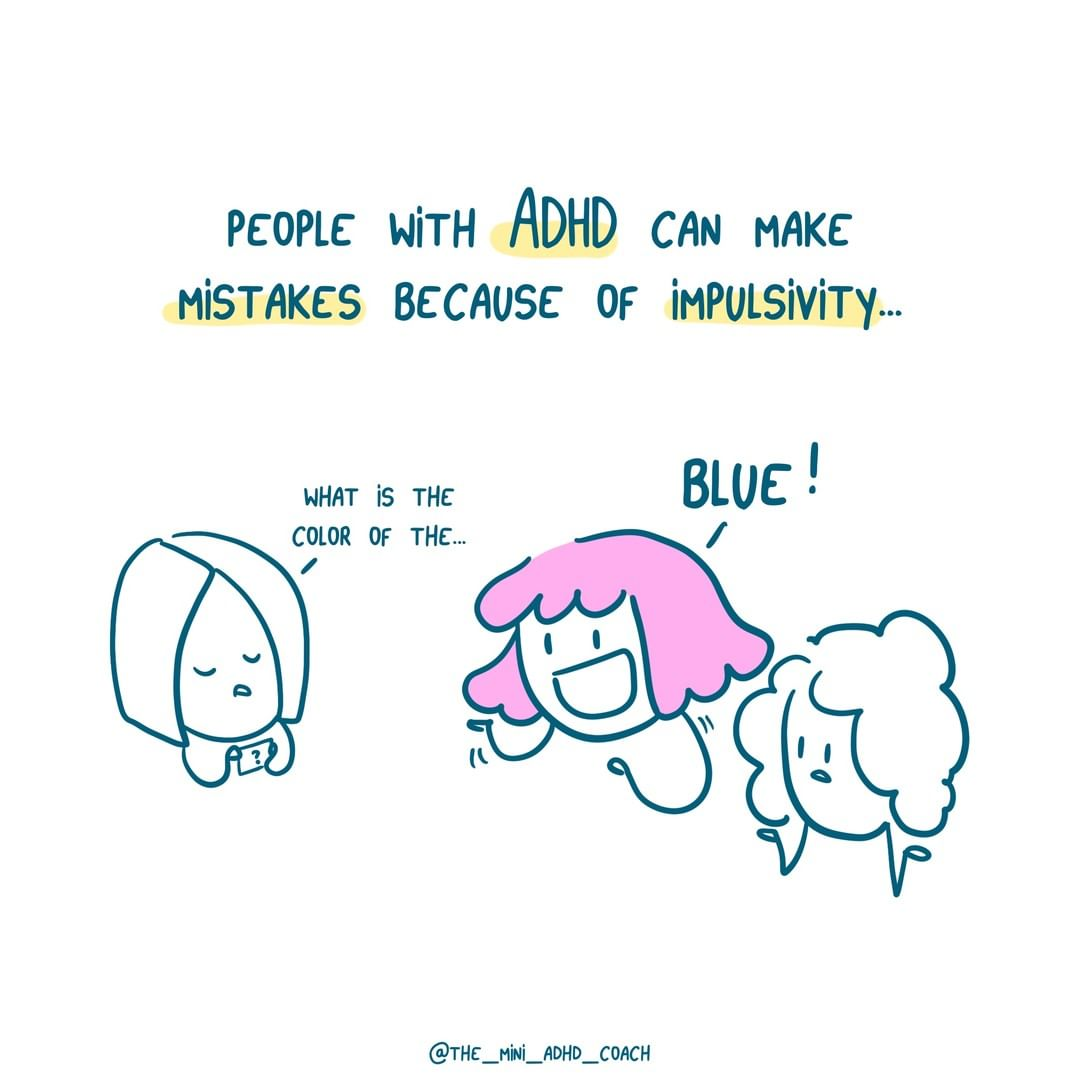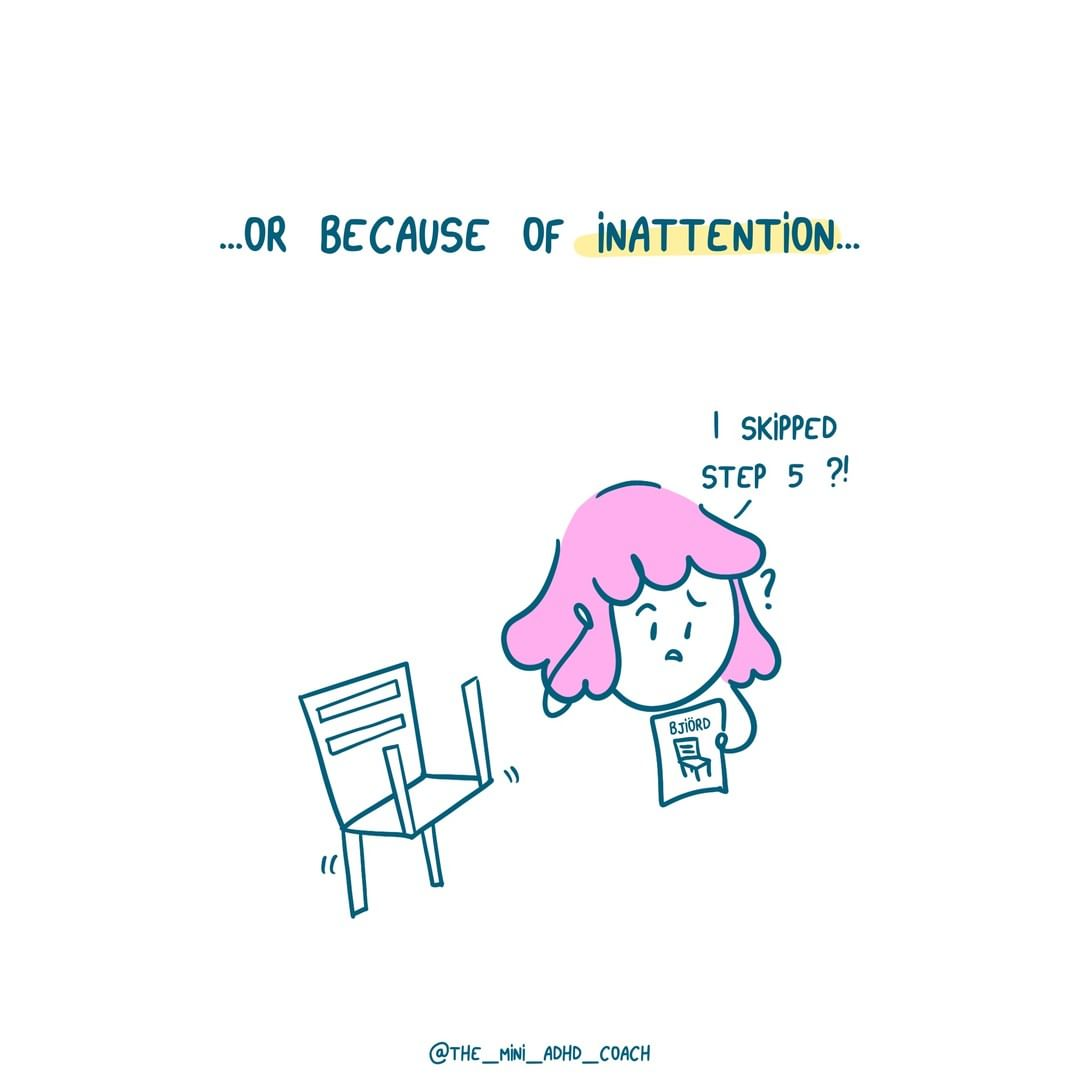The ‘Why’ Behind the Mistakes
Let's break down the 'why' behind making careless mistakes, especially if you're grappling with ADHD symptoms. Sometimes, people chalk these errors up to 'not paying attention,' but as with everything neurodiverse, it's more nuanced than that. ⬇️

The Role of ADHD
Firstly, ADHD isn't just about being scatterbrained or constantly on the go. It's a nuanced disorder that interferes with your focus and attention, complicating tasks and relationships. We're not just talking about forgetting school supplies or missing deadlines at work; ADHD reaches the core of our daily interactions and responsibilities, setting the stage for mistakes. 😬
Ever find yourself working diligently on something, only to discover you made a glaring, yet completely preventable, mistake? 😦 For people with ADHD, these inattentive errors are, unfortunately, pretty standard. It's like your brain juggles 100 tasks simultaneously, but you still miss the ball that matters most.
Impulsivity, hyperactivity and inattention play their own unique roles in mistake-making. Impulsivity often gets in the way of thoroughly weighing the pros and cons before making decisions. In the same way, hyperactivity keeps us in a constant state of 'go,' whether mentally or physically. 🏃

Inattention, on the other hand, can be like a faulty radar system, causing us to miss important details 🔍or overlook critical steps in a task. These traits don't just increase our error rate; they can also mess with our ability to recognize and correct those errors in real time. ❌

I must clarify that making mistakes is not solely an 'ADHD thing.' Every person makes mistakes in life. However, ADHD makes us slightly more prone to slip-ups, leading to more frequent errors in various aspects of life.
But don't beat yourself up; other conditions can also contribute to this pattern, and plenty of neurotypical people struggle with this, too. Regardless, frequent slip-ups can have a knock-on effect on things like our self-esteem and self-efficacy.
Take our fun online quiz to visualize your ADHD traits and learn more about your brain!
TAKE THE FREE TEST
The Emotional Toll of Making Mistakes
Making mistakes, especially those careless ones, can be more than just inconvenient - they can be downright emotionally draining. 😔 One mistake can trigger a landslide of self-doubt, anxiety, and sometimes even depression.
People with ADHD often end up on an emotional rollercoaster after getting something wrong. The link between ADHD symptoms and emotional distress is something to pay close attention to; when anxiety sets in, the difficulty of completing tasks skyrockets. 🚀 It's a vicious cycle; you're anxious about making mistakes, and then the mistakes cause more anxiety. 🤷
Feeling a swirl of regret, guilt, and even shame are common emotions that might appear when we get things wrong. Sometimes, another mistake just pops up no matter how hard we try. This can lead to a downward spiral 🌀of self-blame and the feeling that, despite our best efforts and close attention, mistakes are just an inevitable part of our lives.
When ADHD Meets Learning Disorders
People with ADHD are already prone to making mistakes - be they careless errors in a work task or more significant life decisions. If you add a learning disorder to this equation, it gets even more complex.

For example, the inattentive nature of ADHD may compound the difficulties in reading comprehension or mathematical reasoning that a learning disorder might bring. This makes tasks, like homework or projects at work, even more daunting. 📚
Some common learning disorders that co-occur with ADHD include dyslexia, dyscalculia, and dysgraphia. Each disorder presents its own symptoms, but mixed with ADHD traits like careless mistakes, inattention, and hyperactivity, things can get pretty tricky.
To effectively address this, a thorough understanding of your ADHD symptoms and learning disorder is essential. Often, a comprehensive evaluation from experts can diagnose ADHD along with any co-occurring learning disorders.
However, as the symptoms often overlap, getting an accurate diagnosis can be tricky. For example, if you find yourself making mistakes frequently while reading, it might not just be an ADHD symptom but could also indicate dyslexia.
Strategies and Coping Tips for Managing Mistakes with ADHD
Double (Or Triple) Check
First, don't underestimate the power of double-checking when going through your tasks. It might feel like doing homework twice, but catching those minor, sneaky errors is essential and can decide between a pass and a fail. Remember, ADHD symptoms often include inattention, making you prone to mistakes. So, double-check - or maybe even triple-check! ✅
Get New Perspectives
Whether it's a close friend or an ADHD coach, talking about your challenges can give you fresh perspectives. Opening up about your ADHD diagnosis can introduce you to new strategies for handling symptoms like hyperactivity, impulsivity, and issues with focus. Having someone to talk to is essential for thriving with an ADHD diagnosis, as it can get quite lonely at times. ❣️
Mindfulness
Mindfulness can be your secret weapon against careless mistakes. Practices like deep breathing or meditation can help improve focus and, in turn, help you become more aware of potential errors. It allows you to slow down those impulses before blurting out an answer or rushing into a quick-fire decision. 🔥
Explore Treatment Options
Feeling down about your mistakes? Stress and depression have a terrible habit of showing up when repeated errors seem inescapable. Treatment options like Cognitive Behavioral Therapy (CBT) can help you manage the emotional aspects of ADHD.
Use Visual Reminders
You might think you have the ability to remember everything, but trying to juggle multiple to-dos is the perfect setting for errors. Sticky notes, smartphone apps, and alarms can be lifesavers for people with ADHD.
Remember That You're More Than Your Mistakes
Finally, give yourself a break! We are multi-faceted, complex human beings, not just a bundle of ADHD symptoms or careless mistakes. Life is a journey, and each step - even the missteps - helps you grow. 💪

Conclusion
Everybody makes careless mistakes occasionally - it's part of life. But for adults and even children with ADHD or attention deficit disorder (ADD), these careless mistakes can have bigger repercussions. Your ADHD diagnosis might mean you're more susceptible to errors in tasks that require careful attention, but it doesn't mean that a life of consistent mistakes is inevitable. While symptoms like hyperactivity, impulsivity, and inattention can be challenging, they don't have to define you. 💪
The first step is acceptance, followed by understanding.
Try to understand the symptoms that lead to these mistakes. Is it hyperactivity? Impulsivity? Inattention? 🤔Knowing the root cause is half the battle won; if you need a little help, an experienced ADHD coach can be invaluable. Accepting your ADHD symptoms and learning how to manage them is where treatment options like medication and other helpful techniques can come into play.
So, you lost focus and made a mistake. That's okay! 👍Try to avoid getting lost in a cloud of self-critical analysis paralysis. Recognize the mistake, learn from it, and move on. Accepting your mistakes can improve not just your own life but also your relationships with others. It's all about building understanding for yourself and the people around you.
Sure, some tasks may be harder for you than for others. You may be unable to follow directions precisely or focus on one task for an extended period. But you can stop an error in its tracks ✋by adapting to your environment and taking a careful second look before you make your next move.
In conclusion, while ADHD can make you more susceptible to careless mistakes due to symptoms like hyperactivity and inattention, it's crucial to see these as traits rather than your defining characteristics. You're not your symptoms, and they aren't your whole story. 🙌 Learning coping mechanisms, seeking appropriate treatment, and, most importantly, embracing self-acceptance can significantly improve your life with ADHD.
Whether you've been officially diagnosed or you're considering seeking a diagnosis, remember making mistakes is a universal human experience. No one is perfect, but everyone can grow, learn, and improve. The best action is mutual understanding and supportive practices, like tips to enhance focus and effective treatment options. We're all human beings navigating our unique sets of challenges, and that's okay.
Visualize and assess 25 ADHD traits and understand how they affect your life.
Learn more
ADHD and Making Mistakes: FAQs (Frequently Asked Questions)
Does ADHD cause you to make mistakes?
While ADHD doesn't directly cause mistakes, some symptoms, like inattention or impulsivity, can set the stage for slip-ups. For example, inattentive tendencies might mean you're not fully present while completing a task, leading to errors.Everybody has the ability to make mistakes, ADHD or not,
Besides ADHD symptoms, is there another link between ADHD and making careless mistakes?
Absolutely; besides the common ADHD symptoms, there are also comorbid conditions, such as learning difficulties, dyslexia, or dyscalculia. These can contribute to making careless mistakes for both adults and children.
What can be done to manage these careless mistakes?
The first step is acknowledging that mistakes are a part of being human. If you've received an ADHD diagnosis, it's also crucial to understand your specific symptoms. Consider each mistake a learning opportunity, a stepping stone to improve. For instance, if you find written instructions easier to process, don't hesitate to jot things down during tasks or ask for requests to be put in writing. The goal is to tailor strategies that mitigate your tendency to make careless mistakes. If you find that your mistakes are significantly affecting other activities or areas of your life, it’s important to talk to medical professionals such as doctors specializing in ADHD, or even an ADHD coach.






